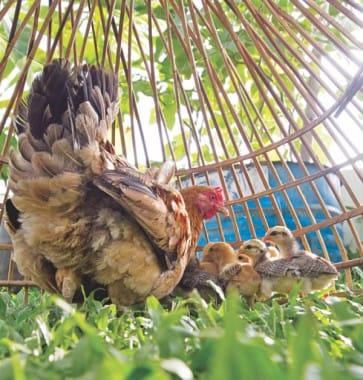Animal activism around the world
In a country where there are millions of people who struggle to get food on the table, animal rights is not something people think about very often. The ecological environment of Bangladesh is already a cause for concern, with poaching, poor animal protection laws and increasing urbanisation. The most tragic example of this is of course the strikingly apparent endangerment of our beloved national animal, the Royal Bengal Tiger.
Many countries in the world, however, are increasingly embracing the importance of cohabiting with animals. There is also increasing awareness of the conditions animals are kept in while being kept in farms to lay eggs, supply milk or be sold as meat. Eggs laid by “cage-free” chickens are more popular in Western supermarkets than the eggs laid by chickens who are kept caged throughout their lives and just fed large amounts of food.
The fancy dish of "foie gras," which is made of liver, has been banned in the State of California. In 2004, California legislators passed a law prohibiting the sale of any product derived from the force-feeding of birds to enlarge their livers. The seven-and-a-half-year grace period was intended to give foie gras producers time to devise a less-cruel method for creating fatty livers. To no one's surprise, they couldn't. As a result, foie gras has been banned in California to stop cruelty to birds.
High-profile companies have not been left far behind due to the issue of corporate social responsibility being a large part of the appeal of companies these days. For years, Adidas manufactured several lines of football boots from the skins of kangaroos, thus subsidizing what the nonprofit “Animals Australia” describes as the largest land-based commercial wildlife slaughter in the world. In September 2012, after years of campaigning by Viva!, Viva!USA, and other groups, Adidas announced it was phasing out its use of kangaroo skin.
Finally, there is also some good news right here in Bangladesh: Established in 2003, Wildteam is a local non-profit that is also registered as a charity in England and Wales. Their Tigerteam project works with the communities in Sundarban to promote positive cohabitation between people and the tigers in the region. Wildteam also conducts fundraising activities in Dhaka to increase social awareness of the conditions in Sundarban.
A balanced ecosystem is really important, especially in the rapidly urbanising world of today. Many countries have begun to realise that. But animals, in general, are not that popular in Bangladesh. Only a handful of us keep pets at home, and those of us living in Dhaka city hardly ever come across animals anyway, besides the odd street dog. But there is a reason humans are not the only species in the world, and it's about time we realise that. The only way we can have a sustainable future is if animals and humans both have their own space. Just think about those rare moments in the morning when you hear birds chirp. There aren't any birds in the sky today compared to how many there were even a decade ago. What if you never hear the birds in the morning ever again? Animals deserve to be respected by us, otherwise mosquitoes and cockroaches will be our only companions in Bangladesh very soon.
Photo: Sazzad Ibne Sayed
Model: Gutla and Boo Radley
Source: BBC and "Striking at the roots" (strikingattheroots.wordpress.com)


 For all latest news, follow The Daily Star's Google News channel.
For all latest news, follow The Daily Star's Google News channel. 




Comments